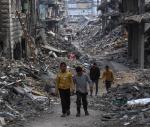You are here
The emergence of the spectre of debt
Apr 12,2022 - Last updated at Apr 12,2022
The World Bank has been warning for several years of the risk of debt explosion in a large number of developing and emerging economies. Economic indicators indicates that loans since 2010 have been growing at an annual rate of 7 per cent, a rate higher than the growth of global output, which is growing at an average rate of less than 4 per cent annually. Low interest rates played a role in delaying the bursting of the debt bubble, which is increasing at record speed. With the return of interests to the rise, the spectre of debt crises appears again on the near horizon.
Debt crises have been recurring for more than fifty years. At the beginning of the eighties of the last century, Latin American countries fell into the trap of mounting debts and financial crises erupted there, and then, after the mid-1990s, the same thing was repeated in Asian countries. However, these crises remained within their regional scope, and their repercussions were limited geographically and within sectors. As for the crisis that the World Bank is currently warning about, it could have global repercussions, due to the increased intertwining, integration and overlap of developing and emerging economies in the global economy during the past twenty years, and this is what we have begun to notice in every new crisis that affects any region, regardless of its type or source.
Since 1970, the World Bank has counted more than five hundred episodes of rapid debt growth in emerging and developed countries, and half of those episodes ended in financial crises that led to a decline in incomes and investments and an exacerbation of unemployment and poverty rates in the countries where these crises erupted.
The World Bank's concern about the upcoming debt crisis stems from the fact that many poor or low-income countries are borrowing from countries that are not members of the Paris Club. The Paris Club is an informal group of creditor countries that seek to find coordinated, sustainable and appropriate solutions to the difficulties faced by debtor countries in repaying their debts. In many of the loans granted by non-Paris Club countries, there are clauses that hide the true size of the commitment faced by the borrowing countries. When defaulting, problems appear that impede debt restructuring plans. Loans granted to a number of poor or developing countries have conditions that remain secret, such as seizing property and income in the event of default. Another point is that countries that have increased debt burdens cannot expand public investment spending that stimulates economic growth. Indeed, in some of them there is a decline in that spending at a time when debts are growing alarmingly.
The risk is great in emerging economies, because 75 per cent of these countries are running budget deficits, noting that their debts in foreign currencies are high. Its current balance deficits are 4 times larger than they were in 2007.
From this standpoint, the World Bank calls for urgent action to address the imbalance before it worsens and crises erupt, by adopting higher transparency with regard to debt data and conditions, adopting strict monetary and financial policies, and strict control over the financial sector.
The Corona crisis and the wars and conflicts spreading in most parts of the world have increased the total indebtedness to its highest level in 50 years, reaching the equivalent of 250 per cent of government revenues. And if these crises occur, they will transform the global landscape. Thirty years ago, developing economies owed most of their external debt to other governments, official bilateral creditors, almost all of whom are members of the Paris Club.
Is the world on the verge of a debt crisis in which a group of developing and emerging countries declare their inability to pay and service their debts, and will there be Arab countries unable to pay and service their debts? The economic indicators concerning the volume and burdens of the debt may indicate that.













